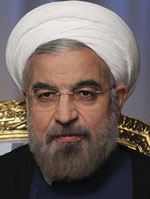Iran forswears nuclear arms, says president
New leader's conciliatory comments intrigue a wary West and its allies
|
 Hassan Rouhani: President of Iran |
In an interview with NBC News days before he travels to New York for a United Nations appearance, the new Iranian president also insisted he had "complete authority" to negotiate a nuclear deal with the United States and other Western powers.
"We have time and again said that under no circumstances would we seek any weapons of mass destruction, including nuclear weapons, nor will we ever," Rouhani said, when asked whether he would forswear nuclear arms.
Rouhani's conciliatory comments appeared to be another sign of his willingness to work toward a diplomatic solution in Iran's bitter nuclear standoff with the West. Washington and its allies are intrigued but wary, seeking tangible steps.
Speaking to the US network at his presidential compound in Teheran, Rouhani said the tone of a letter he had received from President Barack Obama, part of a recent exchange of messages between the leaders, was "positive and constructive".
"It could be subtle and tiny steps for a very important future," Rouhani said six days before he is due to address the UN General Assembly in a speech that will be watched closely.
A willingness by a newly elected president to rule out nuclear arms could help provide a new opening in long-stalled international nuclear talks.
Questions remain about how much bargaining room Iran's supreme leader, Ayatollah Ali Khamenei, a staunch promoter of Iran's nuclear program, will give Rouhani's government, whether in secret talks with Washington or in multilateral discussions with major powers.
Comments on Tuesday by Khamenei about the need for "flexibility" suggest moves at the highest level to explore a compromise solution to Teheran's dispute with the West.
"This government enters with full power and has complete authority," Rouhani said, according to an NBC translation. "I have given the nuclear negotiations portfolio to the foreign ministry. The problem won't be from our side. We have sufficient political latitude to solve this problem."
The White House responded cautiously. "The world has heard a lot from President Rouhani's administration about its desire to improve the government of the Islamic Republic of Iran's relations with the international community, and President Obama believes we should test that assertion," White House spokeswoman Bernadette Meehan said.
"We hope that this new Iranian government will engage substantively in order to reach a diplomatic solution that will fully address the international community's concerns about Iran's nuclear program."
The US and Iran cut diplomatic relations in 1980 after students and militants stormed the US Embassy in Teheran and took diplomats hostage.
























